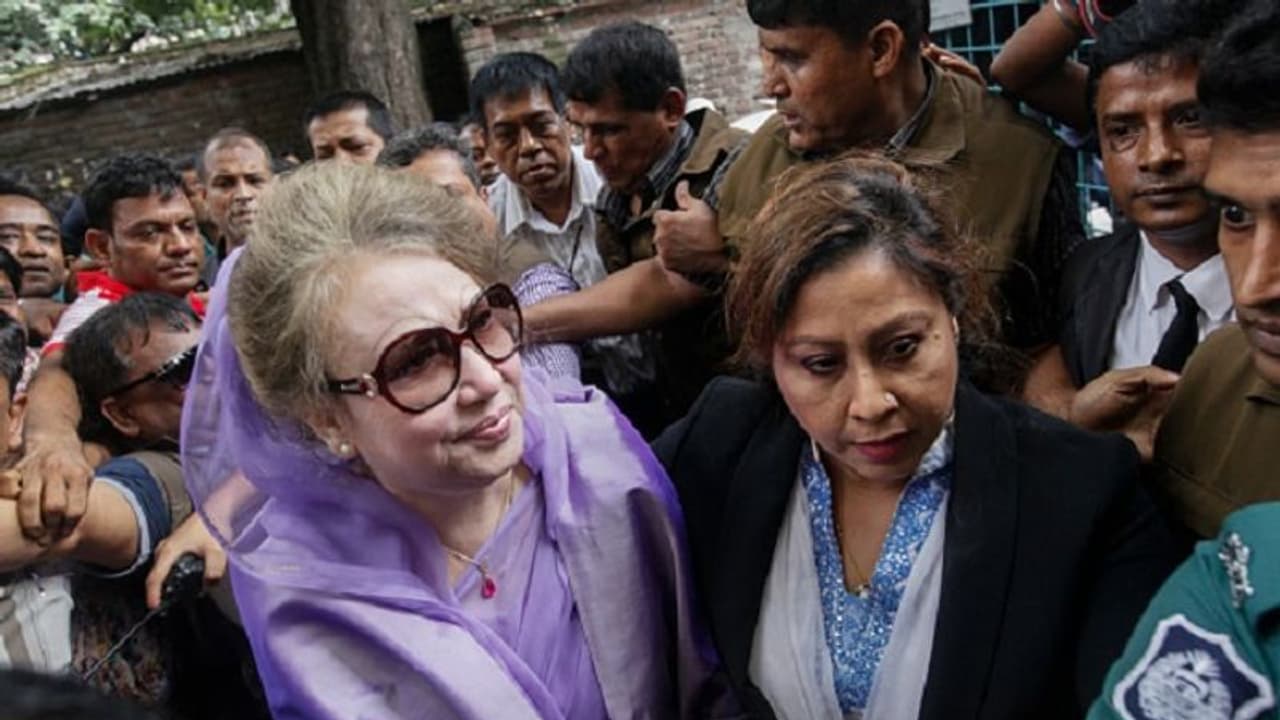The objection to the hearing of the case by a single-judge bench was earlier rejected. The Election Commission’s decision calling Begum Khaleda Zia ineligible was upheld by the high court on Tuesday, leaving the BNP with no chance to get the decision reversed before the election.
Dhaka: The Bangladesh High Court on Tuesday rejected a writ petition that had challenged the cancellation of Bangladesh Nationalist Party (BNP) chairperson and former PM Khaleda Zia’s candidature. This bars her from contesting the December 30 parliamentary elections from three constituencies.
The one-member bench of Justice JBM Hassan passed the order, leaving Bangladesh to a state that many assume to be verging on autocracy of Sheikh Hasina with virtual no competition.
This may be a cause for concern for India in spite of the Hasina government’s friendly association with New Delhi. The court verdict is likely to make the current ruling party behave more brazenly with a renewed mandate, as its victory is now much easier.
Attorney-general Mahbubey Alam said that Khaleda Zia wouldn’t be able to contest the elections as it is the final decision.
Earlier in the morning, the bench had rejected a petition of Khaleda’s counsel expressing ‘no-confidence’ in the single-judge bench. Later, her lawyers boycotted the court, refusing to attend the hearing of the writ.
The high court on Monday adjourned the hearing for today.
Also read: Shake Hasina or stop Khaleda? India's horribly difficult election in Bangladesh
On December 12, Chief Justice Syed Mahmud Hossain had formed the one-member bench to hear the petition over BNP chairperson Khaleda Zia’s candidature in all the three constituencies as the bench of Justice Syed Refaat Ahmed and Justice Md Iqbal Kabir had issued a split order on December 11.
Senior Justice Syed Refaat Ahmed had stayed the Election Commission’s (EC} decision and accepted Khaleda’s appeal while Justice Md Iqbal Kabir had upheld the decision.
Later, the appeal was sent to the Chief Justice as per the rules to form a new bench.
Barrister Kaisar Kamal filed the appeal for the constituency Feni 1; barrister Nowshad Jamir did so for Bogura 6 and advocate Masud Ahmed Talukder did it for Bogura 7.
Khaleda’s nominations for Feni-1, Bogura 6 and 7 constituencies were rejected by the returning officers. The EC upheld the decisions of the returning officers, prompting the former prime minister to move the high court.
Khaleda was jailed for five years in February 8 last in the Zia Orphanage Trust corruption case. Her jail term was doubled by the high court on October 30. A day before that, she was sentenced to seven-year imprisonment by a special court in the Zia Charitable Trust corruption case.
Battle of manifestos
The ruling Awami League and its main opposition BNP announced their manifesto respectively for the upcoming 11th parliamentary election.
The Awami League claims that they will ensure ‘sustainable investment and inclusive development’ if they get the opportunity to come to power for the third time. On the other hand, the BNP makes 19 promises, including that of strengthening of the ownership of the state by the people.
On Tuesday, the announcement came from the two major political parties.
Hasina promises townships in rural areas
Prime Minister and Awami League president Sheikh Hasina on Tuesday rolled out her party’s 21-point manifesto with various pledges, including the expansion of urban facilities to villages and creating a great number of jobs to remove the curse of unemployment.
Hasina released the manifesto ahead of the 11th national election slated for December 30 with the slogan “Bangladesh on the march towards prosperity”.
Launching the manifesto, the AL president said all the facilities that city people enjoy would be extended to rural areas, turning those into townships.
“Each village will be connected to upazila (sub-division) towns,” she said.
Hasina announced that employment opportunities would be created for 1.24 lakh youth while 1000 youths — both men and women — in each upazila will get overseas jobs if her party were voted to power again.
Hasina promised to take steps to make Parliament more effective and strengthen the judiciary.
Also read: As bachchaandolan rocks Bangladesh, is Sheikh Hasina still India’s best bet?
BNP for higher GDP growth, scrapping of ‘black’ laws
The BNP rolled out its election manifesto for the elections on Tuesday with another set of promises, including making democracy an everyday practice, building a revenge-free Bangladesh and raising GDP growth to 11%.
The opposition party also pledged to scrap the controversial Digital Security Act, Official Secrecy Act and other “black” laws if it were to be voted to power.
BNP secretary-general Mirza Fakhrul Islam Alamgir unveiled the party’s manifesto at a city hotel at 11 AM.
“I am announcing the manifesto on behalf of former prime minister and BNP chairperson Khaleda Zia. I want to assure you that no revenge will be taken against anyone if the BNP is voted to power,” said Alamgir.
The promises of BNP include ensuring a balance between the power of the President and that of the Prime Minister, making public the probe reports on BDR carnage and Bangladesh Bank reserve heist and conducting more investigations into the incidents.
The promises include restoration of the referendum system in the Constitution for establishing people’s democratic rights, introducing Upper House of Parliament involving people from all walks of life, increased representation of women in all constitutional institutions.
Alamgir also announced that steps would be taken so that one-party rule does not return to the country. The BNP made a promise to check corruption, too.
